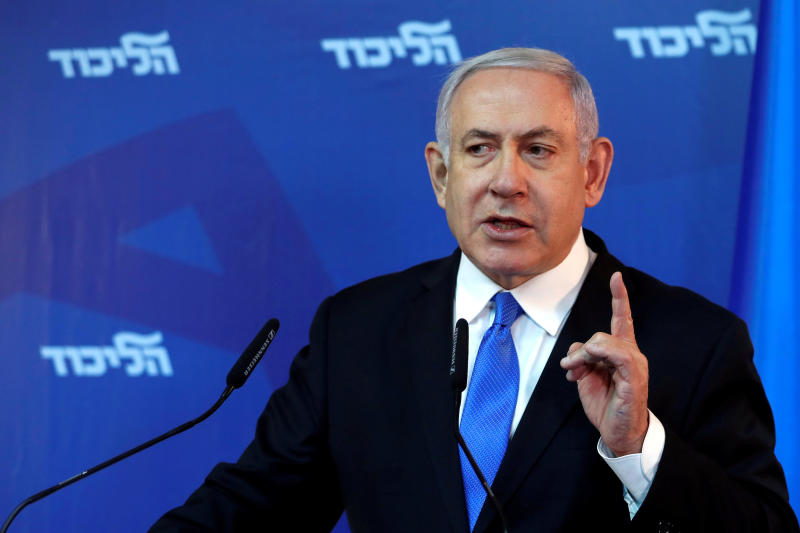Benjamin Netanyahu: What are the allegations against Israeli PM ahead of elections?
Sign up now: Get ST's newsletters delivered to your inbox

In one case, considered the most serious, Israeli Prime Minister Benjamin Netanyahu is accused of advocating regulatory benefits allegedly granted to telecommunications firm Bezeq in exchange for positive news coverage for himself.
PHOTO: REUTERS
JERUSALEM (AFP) - Israeli Prime Minister Benjamin Netanyahu is seeking re-election on April 9 under threat of charges of corruption, fraud and breach of trust.
Last month, he gave a rare and unscheduled television interview to combat allegations of improper behaviour from his rivals.
Mr Netanyahu denies the accusations and calls them an attempt by his political enemies to force him from office.
Here's what you need to know:
WHAT IS HE SUSPECTED OF?
In one case, considered the most serious, Mr Netanyahu is accused of advocating regulatory benefits allegedly granted to telecommunications firm Bezeq in exchange for positive news coverage for himself from a media company owned by the then Bezeq CEO.
Another involves Mr Netanyahu allegedly seeking a secret deal with the publisher of Israel's top-selling newspaper Yediot Aharonot to ensure positive coverage in return for pushing forward a law that would have limited the circulation of a rival paper.
The third case involves suspicions the Premier and his family received luxury gifts such as cigars and champagne from wealthy individuals, including Hollywood producer Arnon Milchan, in exchange for financial or personal favours.
ATTACKS AND DEFENCE
In a January speech launching his centrist Blue and White party, leading Netanyahu challenger Benny Gantz accused the Premier and those around him of becoming "addicted to the pleasures of power, corruption and hedonism".
He has upped the ante since, saying Mr Netanyahu may have pushed for an unnecessary submarine acquisition from Germany's Thyssenkrupp to boost the stock of a company in which he had owned shares.
Mr Netanyahu says he did nothing improper, sold the stock before the submarine sale and reported it to the relevant authorities.
He has fought back by seeking to discredit Mr Gantz, accusing his rival of corruption over contracts sought by a business he ran after retiring from the army.
WILL IT AFFECT THE VOTE?
Attorney-General Avichai Mandelblit has said he intends to charge Mr Netanyahu with fraud, breach of trust and bribery, following up on police recommendations.
Before the formal indictments, however, there will be a hearing after the elections but before July 10 in which Mr Netanyahu will be given the chance to defend himself.
The most widely expected outcome is that Mr Netanyahu will stand trial, but that prospect is unlikely to have a marked effect on the election, according to Dr Denis Charbit, a political scientist at the Open University of Israel.
Some Likud voters, he says, believe that he is the victim of a conspiracy, while others think that while Mr Netanyahu is perhaps flawed, he must be presumed innocent until proven guilty.
AFTER AN INDICTMENT?
If Mr Netanyahu is re-elected and then charged, he will become the first sitting prime minister in Israel's history to find himself in such a situation.
Even if he is charged, Mr Netanyahu, 69, would not legally be forced to withdraw until he had been convicted and exhausted the appeals process.
He has said he intends to govern "for many more years".
Analysts believe he will stay on to fight the charges through every level of the courts, which could take years.


